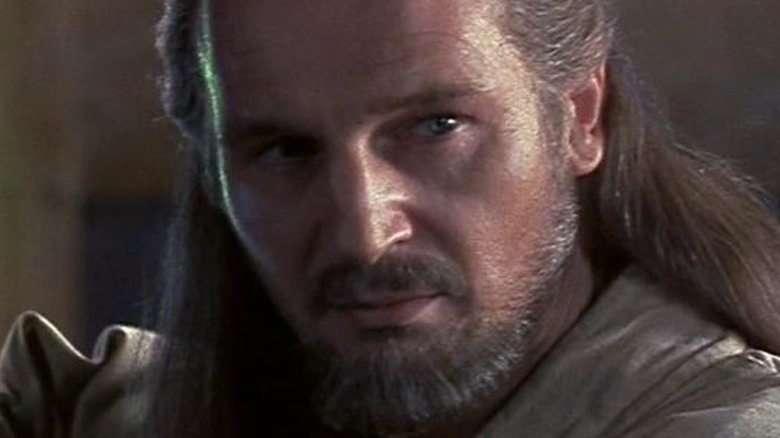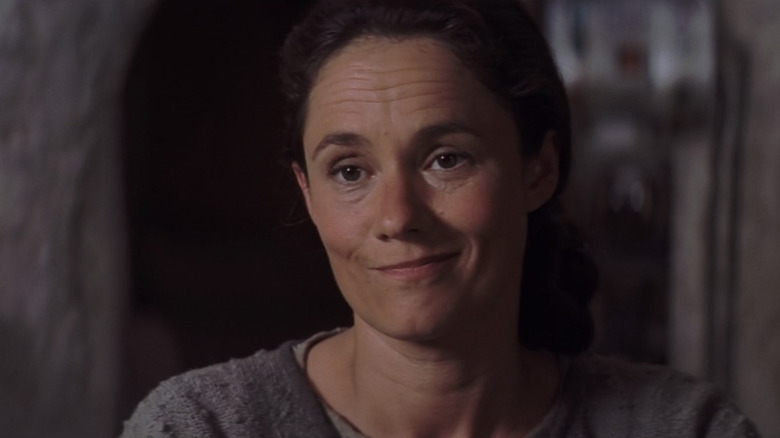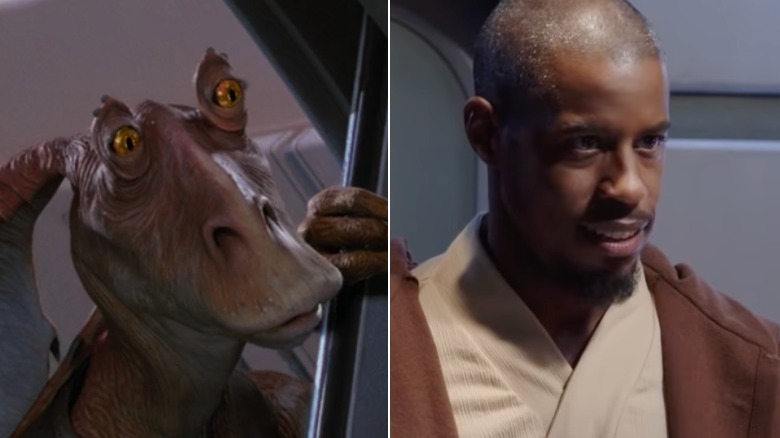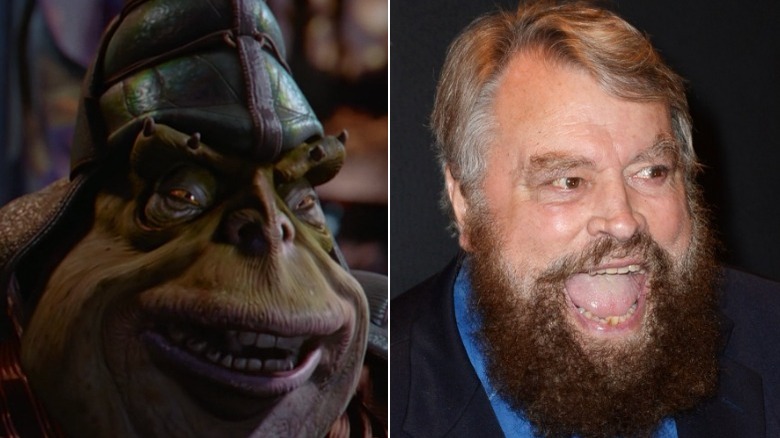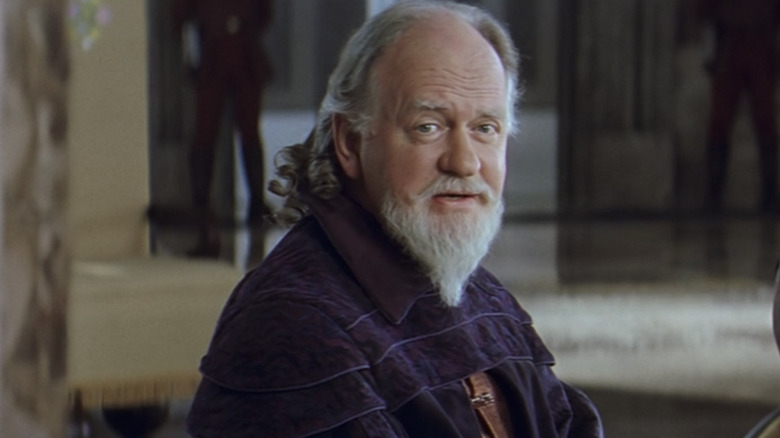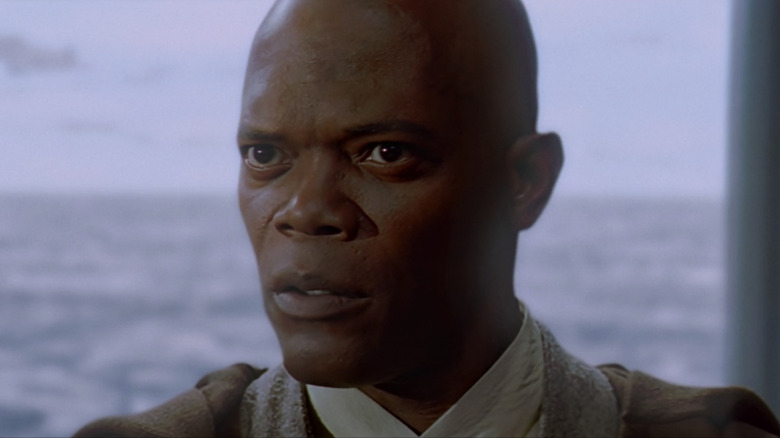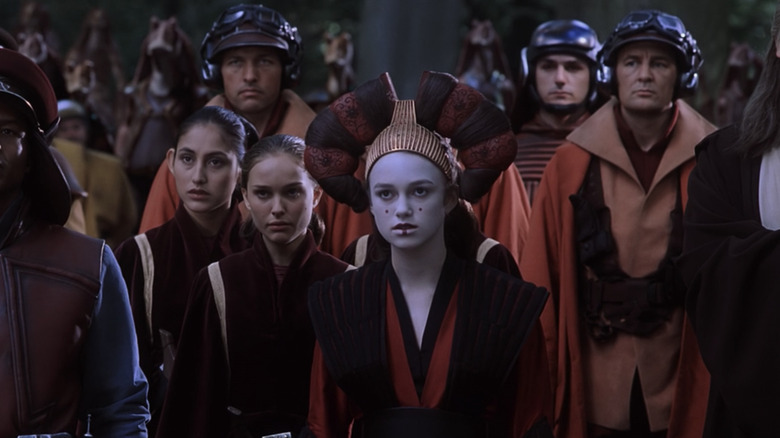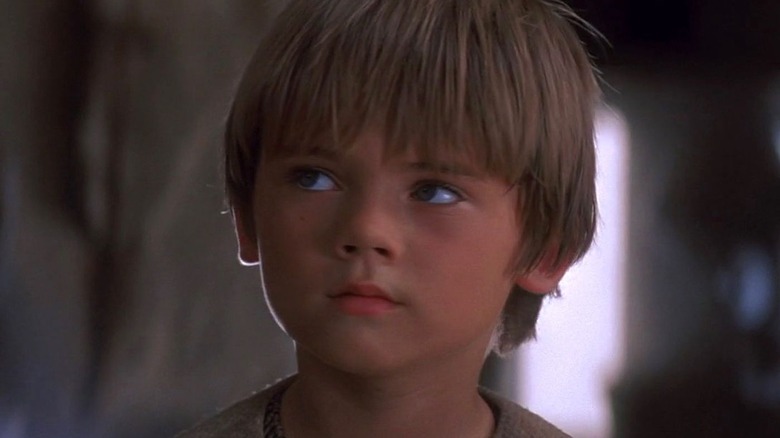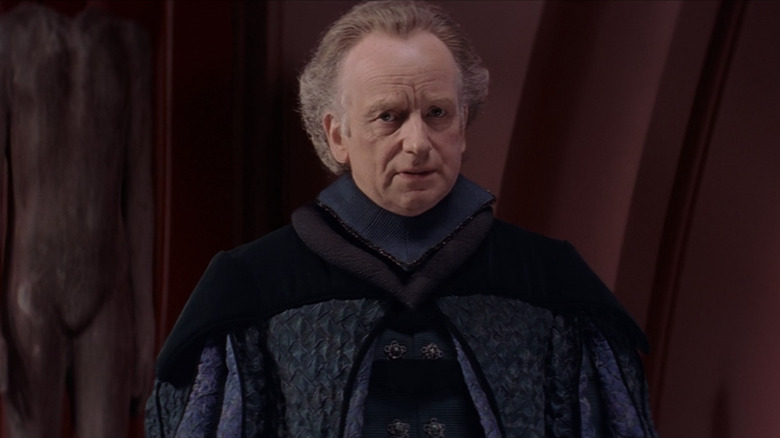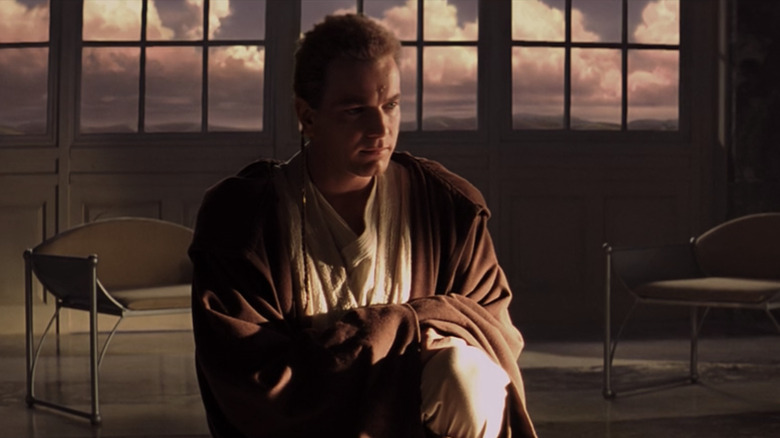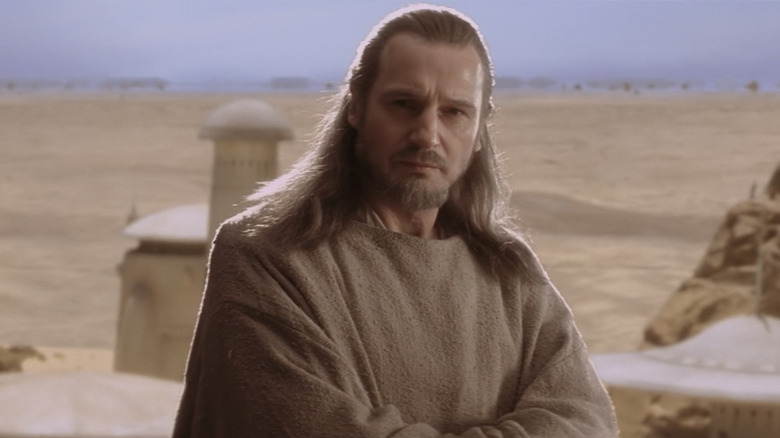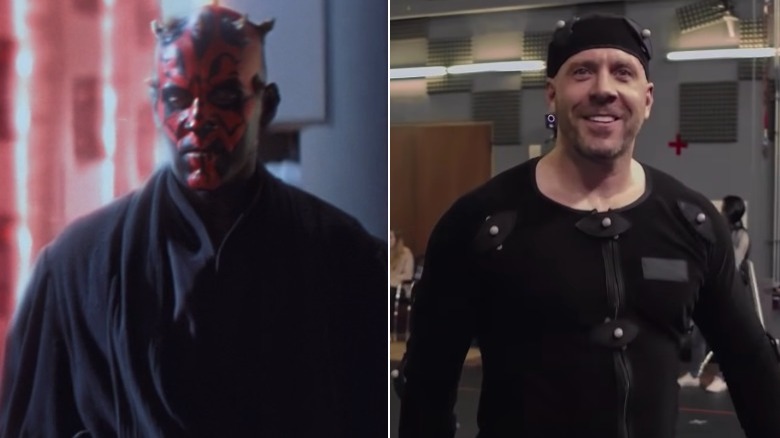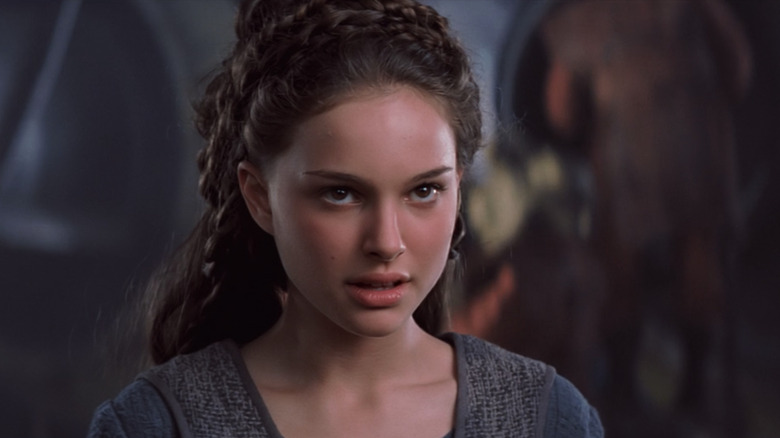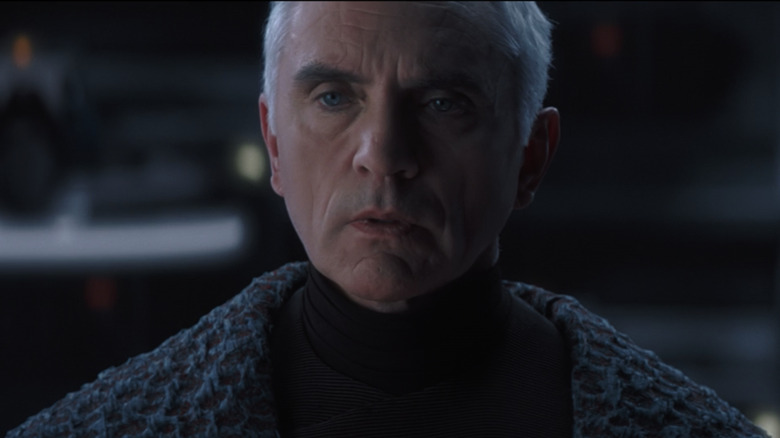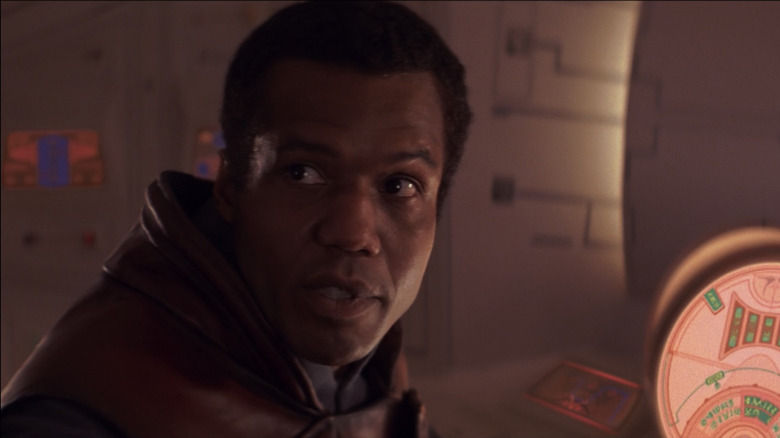Whatever Happened To The Cast Of Star Wars: Episode I - The Phantom Menace?
There wasn't a more hotly anticipated film in 1999 than "Star Wars: Episode I — The Phantom Menace." It had been 16 years since the last cinematic visit to George Lucas' galaxy far, far away, but in that time, "Star Wars" had only grown more popular, with scores of novels, comic books, video games, and toys all coming out through the 1990s. Lucasfilm and 20th Century Fox had primed the pump for a new "Star Wars" film by releasing CGI-enhanced "Special Editions" of "Star Wars" (1977), "The Empire Strikes Back" (1980), and "Return of the Jedi" (1983) into theaters in 1997, giving audiences a taste of what a brand new sequel with state-of-the-art special effects could look like. Fans' expectations were understandably high — perhaps too high.
"The Phantom Menace" was released to great fanfare, incredible box office returns, and decidedly mixed reviews. Its innovations have influenced Hollywood storytelling for decades, with prequels of existing film franchises now commonplace and CGI becoming a standard tool for blockbuster movies to build sets, costumes, and even entire characters from scratch. For many members of the film's cast, however, the whiplash of success followed by fan ridicule was a lot to navigate, with some bearing the brunt of the backlash more than others. Now, over two decades later, let's take a look at what happened to the cast of "Star Wars: Episode I — The Phantom Menace."
Pernilla August
Swedish actress Pernilla August stars as Anakin's saintly, virgin mother Shmi — a slave on the desert planet Tatooine who dreams of a better life for her son. When Jedi Master Qui-Gon Jinn (Liam Neeson) tells her that her son is unusually strong in the Force, she agrees to let him go to Coruscant to receive training. August would reprise her role in the next film, 2002's "Star Wars: Episode II — Attack of the Clones," as well as on an episode of the animated series "Star Wars: The Clone Wars" in 2011.
August's brush with blockbuster American filmmaking turned out to be brief. Later in 1999, she played a different virgin mother in the Hallmark TV movie "Mary, Mother of Jesus" opposite Christian Bale. She soon returned to Sweden, however, where she remains one of the nation's most beloved actors. In 2002, she starred in a Stockholm production of Henrik Ibsen's classic play "Ghosts" directed by the legendary Ingmar Bergman, who August had already worked with earlier in her career. Her 2010 directorial debut "Beyond," starring Noomi Rapace, was a festival favorite that year. August continues to be a mainstay in Sweden, both in front of and behind the camera. In 2021, she lent her voice to the family film "The Ape Star" and appeared in the coming-of-age television drama "Young Royals."
Ahmed Best
There are essentially two ways of looking at the character of Jar Jar Binks, played by Ahmed Best in "The Phantom Menace." As an early example of how motion capture technology can render a live-action performance in CGI, it's a triumph, paving the way for everything from Andy Serkis' Gollum to Josh Brolin's Thanos. As a character the audience should be able to tolerate for more than five seconds, though, Jar Jar is a disaster — a childish bumbler whose long dreadlock-style ears and patois-like speech edge uncomfortably close to racial caricature. None of this should have been blamed on Best, but unfortunately, the actor became an easy target for fans' ire.
The New York-born Best was plucked from the touring ensemble of the Broadway hit "Stomp," with "The Phantom Menace" being his first credited film role. Despite the backlash, Best appeared as Jar Jar in the next two films and voiced the character in video games and animated series, but he had difficulty finding meaningful work beyond Lucasfilm. In a wide-ranging 2017 interview with Wired, Best admits to feeling frustrated and depressed that he did not have the immediate success that some of his co-stars enjoyed. Feelings about "The Phantom Menace" and Jar Jar have softened a bit in recent years, however, and Best was given a hero's welcome by convention-goers at the 2019 Star Wars Celebration Chicago. In 2020, he donned his own set of Jedi robes as host of the Disney+ kids competition series "Jedi Temple Challenge."
Brian Blessed
British actor Brian Blessed was already a veteran of stage and screen when "Star Wars" came calling, with credits going back to the early 1960s. Blessed voices Boss Nass, the head Gungan in charge of the amphibious race's underwater civilization on planet Naboo. At first, he refuses Qui-Gon and Obi-Wan's entreaties to help his above-ground human counterparts in their struggle against the Trade Federation, but he later sends a full army to repel the Federation's battle droids, unintentionally turning Jar Jar into a war hero.
Blessed is known for his roles in classic BBC shows like "I, Claudius" and "Z-Cars," as well as "Robin Hood: Prince of Thieves" and "Flash Gordon." He's provided vocal performances for video games too, such as the "Warhammer" series and "Kingdom Hearts" (reprising his role from Disney's 1999 adaptation of "Tarzan"). Kids and parents might also recognize him as the voice of Grampy Rabbit on "Peppa Pig." In 2015, Blessed collapsed on stage during a performance of "King Lear," and though he was able to finish the performance, he eventually withdrew from the production. 2018 saw him return to Sherwood Forest as Friar Tuck in the adaptation "Robin Hood: The Rebellion." Despite being well into his eighties, Blessed continues to work steadily and shows no signs of slowing down anytime soon.
Oliver Ford Davies
From the very first "Star Wars" film in 1977 up through "The Rise of Skywalker" in 2019, the series has often filled out its ranks of supporting characters, aliens, and monsters with acclaimed British actors. Oliver Ford Davies is one of them, turning up in all three prequels as Sio Bibble, governor of Naboo under Queen Amidala (Natalie Portman).
Born in 1939, Davies was performing with the Royal Shakespeare Company as early as age 20. Many of his most notable onscreen roles have been in televised adaptations of RSC productions, such as "Richard II," "Henry V," and "Troilus and Cressida," all within the 2010s. "Game of Thrones" viewers might recognize Davies as the duplicitous Maester Cressen from the Season 2 premiere "The North Remembers," while Rowan Atkinson fans may know him as the Archbishop of Canterbury in Atkinson's popular James Bond parody "Johnny English." In 2021, Davies played celebrated 20th-century author Graham Greene in the filmed stage play "A Splinter of Ice." He has been nominated for an Olivier Award for his stage work three times, winning once for the David Hare play "Racing Demon."
Samuel L. Jackson
"I didn't know what I was doing." That's what Samuel L. Jackson told Seth Meyers in 2016 when he was asked about being cast in "The Phantom Menace." Fresh off the success of "Pulp Fiction," Jackson mentioned in a talk show appearance that he would love to work with George Lucas on the new "Star Wars" movie, and soon after, he was called to a meeting at Lucas' Skywalker Ranch in northern California. Jackson hadn't seen so much as a script before heading to London to begin filming. In fact, it wasn't until his costume fitting that he learned he would be playing the skeptical Jedi council member Mace Windu.
Jackson would play Windu again in both "Attack of the Clones" and "Revenge of the Sith," wielding his famous purple lightsaber. He soon followed one major franchise with another, ushering in the Marvel Cinematic Universe as Nick Fury in 2008's "Iron Man," whom he has played more than a dozen times and counting. Jackson has also indulged in some non-Marvel superhero action, appearing in 2004's "The Incredibles" and its 2018 sequel, as well as Frank Miller's "The Spirit" in 2008. Despite his skill in effects-heavy blockbusters, Jackson has stayed true to the more personal films that defined his early career, reuniting with Quentin Tarantino on "Inglourious Basterds," "Django Unchained," and "The Hateful Eight."
Keira Knightley
British actress Keira Knightley was still in her teens and had just a handful of acting credits when she was cast in "The Phantom Menace" as Sabe, Queen Amidala's handmaiden and occasional decoy. It's a small role, which is perhaps why her time in "Star Wars" is little more than a fun footnote in what has become a massively successful career in film.
Knightley wouldn't have to wait long after "Star Wars" to become a household name. In 2002, she starred in Gurinder Chadha's sleeper hit "Bend it Like Beckham," and she followed that up with megahits like "Pirates of the Caribbean: The Curse of the Black Pearl" and "Love Actually." Knightley would return to the "Pirates" franchise throughout her career, most recently in 2017's "Dead Men Tell No Tales," but otherwise she's mostly eschewed those sorts of big effects-heavy spectacles. Her collaborations with director Joe Wright on "Pride and Prejudice," "Atonement," and "Anna Karenina" are some of her most celebrated roles. "Pride and Prejudice" netted her an Oscar nomination for Best Actress, and she received a Best Supporting Actress nomination for the 2014 Alan Turin biopic "The Imitation Game." In addition to her film work, Knightley has long been the face of Coco Mademoiselle perfume.
Jake Lloyd
Aside from Ahmed Best, no one faced more ridicule or scorn for their performance in "The Phantom Menace" than actor Jake Lloyd, who was only 10 years old when the film premiered in 1999. As Anakin Skywalker, the weight of the entire film — if not the entire franchise — rested on his young shoulders, with little help from a script that gave him "Yippee!" as a catchphrase and a director who has been credibly accused of being more interested in effects than actors. Months before the film even opened, the unflattering nickname "Mannequin Skywalker" was already making the rounds, prompting an angry letter in Lloyd's defense from former child star and future "Solo: A Star Wars Story" director Ron Howard.
Prior to his debut as Anakin, Lloyd had recurring roles on "ER" and "The Pretender" and had starred in "Jingle All the Way" with Arnold Schwarzenegger, but the pressures of fame coupled with the negative reaction to his performance led him to leave acting behind. His last non-Anakin role was in the 2001 sports drama "Madison." Lloyd moved to Chicago after high school to attend Columbia College. After a domestic violence incident was followed within months by a reckless driving arrest in 2015 (per TMZ), Lloyd's family released a statement to Geek News Now that he'd been diagnosed with schizophrenia several years earlier, and he was eventually admitted to a psychiatric facility for treatment.
If you or someone you know is struggling with mental health, please contact the Crisis Text Line by texting HOME to 741741, call the National Alliance on Mental Illness helpline at 1-800-950-NAMI (6264), or visit the National Institute of Mental Health website.
Ian McDiarmid
Scottish actor Ian McDiarmid is one of the few stars of the original "Star Wars" trilogy to reprise their role for the prequels. His "Return of the Jedi" character, Emperor Palpatine, was played by Clive Revill in the original release of "The Empire Strikes Back," with McDiarmid taking over the role for the third film under a heavy layer of makeup (and replacing Revill in subsequent versions of "Empire"). For "The Phantom Menace," released 16 years later, he played a younger, healthier Palpatine, making power plays behind the scenes as Naboo's delegate in the Galactic Senate while secretly manipulating events as the sinister Sith Lord Darth Sidious.
Palpatine's rise to power is one of the better-executed plotlines in the often shabby prequel trilogy — a cautionary tale of a society sacrificing freedom for security. McDiarmid guided the character from a backstage schemer to a full-bore dictator, then reprised the role one last time (presumably) in 2019's "The Rise of Skywalker." In between "Star Wars" gigs, he's been a frequent presence on British stages and television sets, starring in the 18th-century crime series "City of Vice" in 2008 and playing a featured role in the 2017 historical adventure series "Britannia." In 2006, McDiarmid won the Tony Award for Best Featured Actor in a Play for the revival of Brian Friel's "Faith Healer," opposite fellow Tony winner Ralph Fiennes.
Ewan McGregor
In many ways, Ewan McGregor had the biggest shoes to fill of any actor in "The Phantom Menace." Though Jake Lloyd was playing the boy who would one day be Darth Vader, it was a version of the character that had never been seen in the original trilogy. McGregor, on the other hand, was stepping straight into the Jedi robes of Obi-Wan Kenobi, memorably played in the first three films by Sir Alec Guinness. McGregor makes the role his own with a twinkle in his eye and a slight Guinness-y lilt to his voice, managing better than most of his co-stars to find the humor and pathos in the prequels' frequently clunky dialogue.
McGregor had previously made a name for himself in the breakout Scottish indie film "Trainspotting." His post-"Star Wars" career has been a similar mix of bold, challenging work, like the black comedy "I Love You Phillip Morris," and occasional blockbusters, such as "The Island" and "Big Fish." Some of his most acclaimed roles have been on television, however. He was Emmy-nominated for his role as a pair of ne'er-do-well siblings in the third season of FX's "Fargo," and he won in 2021 for his lead role in the Netflix limited series "Halston." McGregor reprises the role of Obi-Wan Kenobi in the 2022 Disney+ series of the same name, which picks up from where the character left off at the end of "Revenge of the Sith."
Liam Neeson
Prior to "The Phantom Menace," Irish actor Liam Neeson was best known for sensitive performances in prestige dramas like "Schindler's List," "Nell," and "Michael Collins." Only a couple of credits on his resume, like Sam Raimi's gonzo superhero flick "Darkman" and the Scottish rebel biopic "Rob Roy," would suggest the two-fisted man of action he has become on film in the last two decades. The role of Jedi Master Qui-Gon Jinn splits the difference between these competing trends in Neeson's career, both meditative and forceful (no pun intended) and, it must be said, perhaps not the brightest lightsaber in the Jedi Temple. When his padawan Obi-Wan utters the series catchphrase "I have a bad feeling about this," Qui-Gon responds with "I don't sense anything," moments before they are attacked.
Neeson would take on a similar mentor role in the 2005 comic book reboot "Batman Begins," but his "ass-kicking dad" era wouldn't begin in earnest until 2008's "Taken." Since then, Neeson has released a new action feature every year or two. Titles like "The Grey," "Unknown," and "A Walk in the Tombstones" lean on his aging gravitas in the service of revenge plots, thrillers, and survival tales. He's also willing to lampoon his own image, as in 2014's "The Lego Movie" and Seth McFarland's parody Western "A Million Ways to Die in the West."
Ray Park
Scottish actor and stunt performer Ray Park studied martial arts since he was a boy, and he hadn't been working in Hollywood long when he was cast as the horned and tattooed Sith Lord Darth Maul. Park's acrobatic skills set the tone for the prequel trilogy's lightsaber duels, which were far more fast-paced and kinetic than the ones featured in the first three "Star Wars" films. Even at the height of anti-prequel discourse, when everything about the films was fair game for ridicule, "Star Wars" fans could all agree on one thing: Darth Maul was really cool.
Park followed up "The Phantom Menace" by playing the Headless Horseman (alongside Christopher Walken) in Tim Burton's "Sleepy Hollow" and mutant villain Toad in the first "X-Men" movie in 2000. He appeared on Season 4 of the NBC superhero series "Heroes," played Chuck Norris in a 2008 Chinese miniseries based on the life of Bruce Lee, and donned the black mask as ninja villain Snake Eyes in "GI Joe: The Rise of Cobra" and its 2013 sequel. Over the years, Park has returned to the role of Darth Maul several times, most notably in the 2018 prequel "Solo: A Star Wars Story." He was originally intended to reprise the role in "Obi-Wan Kenobi," but his role was reportedly cut out when the series' scripts were heavily rewritten before filming began.
Natalie Portman
Natalie Portman made a name for herself at a young age with a series of affecting turns in heavy adult dramas like "The Professional" and "Heat." Those were the types of roles she generally played before being cast as Padmé Amidala — Queen of Naboo and future mother to Luke Skywalker and Princess Leia — and for the most part, they're the types of roles she's played since. Like co-star Ewan McGregor, Portman's time in a galaxy far, far away is a foundational part of her stellar career, but it's also just one chapter of it.
As large as "Star Wars" looms on her resume, Portman is arguably just as iconic (for better or worse) as Manic Pixie Dream Girl Sam in Zach Braff's 2004 hit "Garden State." In the 2000s, she worked with directors like Wes Anderson, Wong Kar-wai, and Mike Nichols, among many others, receiving her first Academy Award nomination for Darren Aronofsky's 2010 psychological thriller "Black Swan." She won the Oscar for Best Actress in 2017 for playing Jackie Kennedy Onassis in the biopic "Jackie." In 2010, Portman joined the Marvel Cinematic Universe in "Thor" as the God of Thunder's love interest Jane Foster, reprising the role in the 2013 sequel "Thor: The Dark World." Though Portman skipped the series' third installment, she is set to return in 2022's "Thor: Love and Thunder." Outside of her film work, Portman is an animal rights activist, a vocal supporter of the #MeToo movement, and a surprisingly good rapper.
Terence Stamp
Classic British tough-guy actor and erstwhile General Zod Terence Stamp plays Chancellor Valorum in "The Phantom Menace," the weak-willed leader of the Galactic Senate who proves no match for the shady maneuverings of Senator Palpatine. Stamp was famously not a fan of his time in the "Star Wars" universe (per IndieWire). He's criticized George Lucas' obsession with special effects, as well as his paltry salary, which included a stencil set as payment for an extra day of shooting. Stamp has said that he only took the job because he had a "crush" on Natalie Portman — a somewhat problematic claim given that she was roughly a third his age at the time of production.
Known for 1960s Mod classics like "Poor Cow" and "Modesty Blaise," Stamp was on something of a comeback streak in 1999, appearing in Steven Soderbergh's "The Limey" that same year and in the drag classic "The Adventures of Priscilla, Queen of the Desert" just a few years before. Afterwards, Stamp appeared in comedies like "My Boss' Daughter" and "Yes Man" and dramas like the Mormon western "September Dawn" and Tim Burton's "Big Eyes." He returned to the world of Superman in 2003, voicing the Man of Steel's birth father Jor-El on more than 20 episodes of the WB/CW teen series "Smallville." In 2021, Stamp appeared in Edgar Wright's Mod throwback thriller "Last Night in Soho."
Hugh Quarshie
Ghana-born British actor Hugh Quarshie appears in "Star Wars: Episode I — The Phantom Menace" as Captain Panaka of the Naboo royal guard, who accompanies Queen Amidala to the planet Tatooine while on the run from the Trade Federation. Panaka also gets the honor, so to speak, of introducing R2D2 to the "Star Wars" universe.
A member of the Royal Shakespeare Company since 1981, Quarshie is another of the many well-versed British thespians who've filled out small roles in the sci-fi franchise. Arguably best known to American audiences for his roles in "Highlander," "Fantastic Beasts: The Crimes of Grindelwald," and two episodes of David Tennant-era "Doctor Who," he's known to British audiences for his nearly two-decade turn on the long-running BBC medical drama "Holby City." Quarshie's surgical consultant Ric Griffin was introduced in the show's fourth season in 2001 and bowed out some 500 episodes later in 2020. Since then, he's appeared on the comedy series "Breeders" opposite Martin Freeman and in the 2021 true crime docudrama "Stephen."
